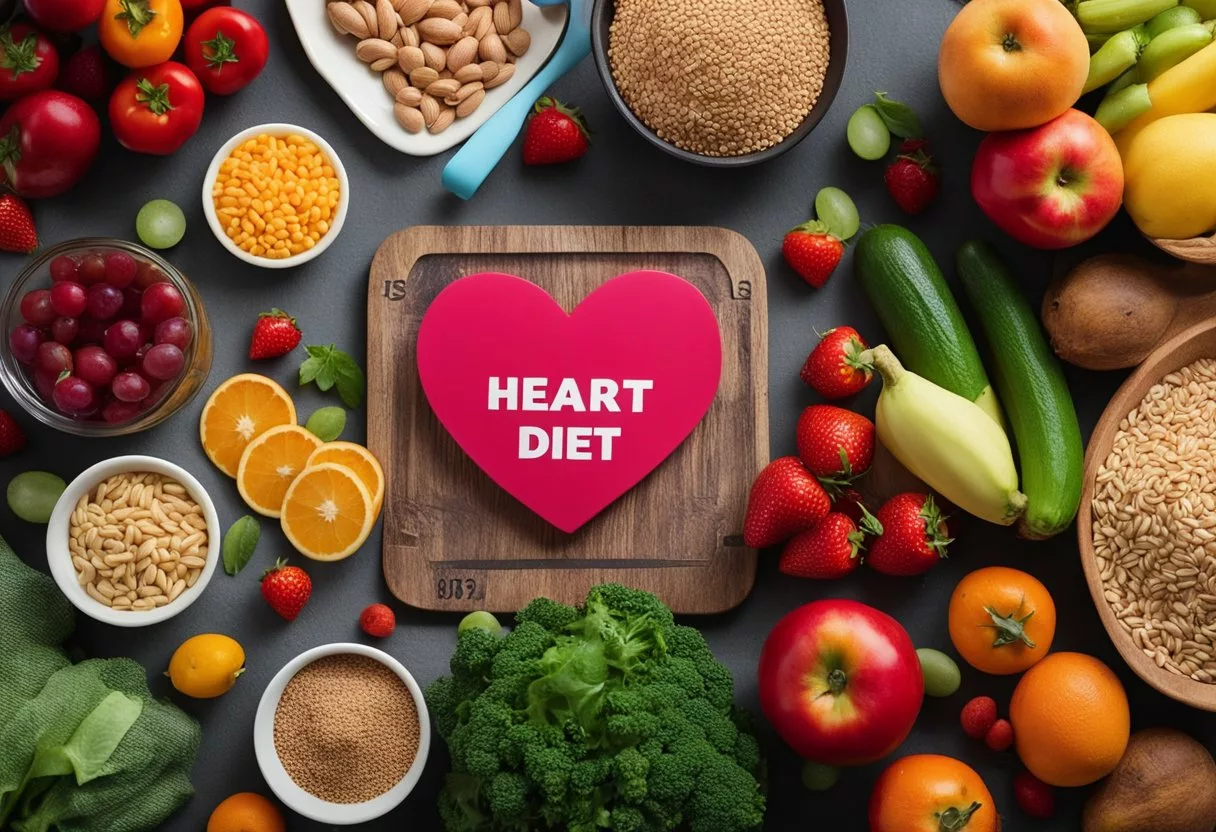Eating the right foods can make a big difference in heart health. A heart-healthy diet focuses on plenty of fruits, vegetables, whole grains, and lean proteins. Incorporating these nutritious choices into your meals can help prevent cardiovascular disease and improve overall well-being. Simple changes in your diet can benefit your heart in the long run.

Choosing healthy fats is essential for maintaining good heart health. Adding foods like olive oil, nuts, seeds, and fatty fish can provide the necessary healthy fats that support cardiovascular health. Reducing salt and avoiding foods high in sugar and unhealthy fats can further protect your heart.
Portion control and mindful eating also play significant roles in maintaining a healthy lifestyle. Using smaller plates or bowls can help control portions and ensure you’re eating balanced meals without overeating. This mindful approach can lead to better weight management and reduced risk of heart disease.
Key Takeaways
- A heart-healthy diet includes a variety of fruits, vegetables, and lean proteins.
- Choosing healthy fats can support cardiovascular health.
- Portion control is key to maintaining a balanced diet.
Understanding Heart-Healthy Nutrition

A heart-healthy diet reduces the risk of heart disease, stroke, and high blood pressure. It focuses on the right balance of macronutrients and micronutrients, fostering better overall heart health.
The Role of Diet in Heart Health
Diet significantly impacts heart health. Eating the right foods can lower cholesterol levels, reduce blood pressure, and decrease the risk of heart disease. Foods rich in fiber, such as fruits and vegetables, help manage cholesterol and improve digestion.
Reducing intake of processed foods and added sugars is essential. These can lead to weight gain, which is a risk factor for heart disease. Opting for whole grains, lean proteins, and healthy fats contributes to a more balanced and heart-friendly diet.
Macronutrients and Heart Health
Proteins, carbohydrates, and fats play crucial roles in maintaining heart health. Protein from lean sources like chicken, fish, and legumes supports muscle health without adding unhealthy fats.
Carbohydrates from whole grains, fruits, and vegetables provide energy and fiber, aiding in digestion and maintaining stable blood sugar levels. This helps manage weight and reduces the risk of heart disease.
Fats are essential, but it’s important to focus on healthy fats like those found in olive oil, nuts, and avocados. These can improve heart health by lowering bad cholesterol. Avoid trans fats and limit saturated fats, which can increase the risk of heart disease.
The Importance of Micronutrients
Vitamins and minerals are crucial for heart function. Potassium, found in bananas and potatoes, helps control blood pressure. Magnesium supports heart rhythm and can be found in leafy greens and nuts.
Antioxidants, such as vitamin C and E, protect the heart from damage by neutralizing free radicals. Foods like berries and citrus fruits are rich in these antioxidants. Calcium and vitamin D also play roles in maintaining a healthy heart and bones.
Ensuring a diet rich in these micronutrients supports overall cardiovascular health and helps prevent heart-related issues.
Guidelines for a Heart-Healthy Diet

Eating a heart-healthy diet means choosing nutritious foods that support cardiovascular health while avoiding those that can be harmful. Here are some key guidelines to follow.
Recommended Foods
Fruits and Vegetables: These are rich in vitamins, minerals, and fibers. Consuming a variety of colorful fruits and vegetables helps reduce the risk of heart disease.
Whole Grains: Foods like brown rice, oats, and whole wheat bread are packed with nutrients and fibers that support heart health. They help control blood pressure and cholesterol levels.
Legumes and Nuts: Beans, lentils, almonds, and walnuts are great sources of protein and healthy fats. These foods can reduce bad cholesterol levels and improve heart function.
Fish: Fatty fish such as salmon and mackerel are high in omega-3 fatty acids, which can lower the risk of heart disease. Aim for at least two servings of fish per week.
Healthy Fats: Use plant-based oils, like olive and canola oil, instead of butter or lard. These oils are high in unsaturated fats, which are better for your heart.
Foods to Limit or Avoid
Salt: High sodium levels can increase blood pressure, leading to heart issues. It is recommended to consume no more than 2,300 milligrams of sodium per day. Reducing salt intake can improve heart health significantly.
Saturated and Trans Fats: Found in red meat, cheese, and baked goods, these fats can increase bad cholesterol levels. Limit these foods to maintain healthy cholesterol levels and support heart health.
Processed Meats: These often contain high levels of salt and unhealthy fats. Limiting consumption of bacon, sausages, and deli meats can lower heart disease risk.
Refined Grains and Carbohydrates: Foods like white bread, pastries, and sugary cereals can spike blood sugar levels and increase heart disease risk. Opt for whole grain alternatives whenever possible.
Ultra-Processed Foods: These include many snack foods, flavored drinks, and fast foods. They are high in unhealthy fats, sugars, and sodium, which can all contribute to heart disease. Eating fresh and minimally processed foods is a healthier choice.
Eating Practices for Heart Health

Adopting specific eating practices can significantly improve heart health. Key strategies include effective meal planning, understanding portion sizes, and cooking at home so that meals are healthier and more nutritious.
Meal Planning for Optimal Nutrition
Planning meals ahead can help ensure a balanced and heart-healthy diet. Focus on incorporating a variety of whole foods: fruits, vegetables, whole grains, and plant-based proteins like beans and lentils. This approach ensures that the diet remains rich in nutrients while being low in unhealthy fats and added sugars.
Using a weekly planner to outline meals can also prevent last-minute unhealthy choices. Simple swaps, such as choosing brown rice instead of white or whole-wheat bread instead of white bread, add more fiber and essential nutrients. Including healthy proteins like fish, nuts, and seeds ensures balanced nutrition without the excess calories and saturated fats found in processed meats.
Understanding and Managing Portion Sizes
Controlling portion sizes is crucial in preventing weight gain and reducing the risk of obesity, which are significant risk factors for heart disease. Using smaller plates and bowls can trick the mind into feeling satisfied with less food.
Pay attention to the serving sizes listed on nutrition labels. Measuring portions with cups or a kitchen scale can provide a better understanding of what an appropriate serving looks like. Eating slowly and savoring each bite can help recognize signs of fullness and avoid overeating. This mindful eating practice supports weight management and prevents overeating, contributing to long-term heart health.
The Impact of Cooking at Home
Cooking at home allows for better control over the ingredients used, leading to healthier and more nutritious meals. When preparing food at home, opt for minimally processed foods and avoid those high in added sugars and unhealthy fats. Fresh vegetables, lean meats, and healthy fats like olive oil can form the base of a heart-healthy meal.
Using quick and simple recipes can make cooking at home more practical and enjoyable. Experimenting with herbs and spices can add flavor without extra salt, improving heart health. This practice makes it easier to maintain a diet that supports heart health in the long run.
Specific Nutrient Considerations

A heart-healthy diet focuses on managing sodium, balancing healthy fats, integrating fiber-rich foods, and moderating sugar and sweeteners to support cardiovascular health.
Managing Sodium and Salt Intake
High blood pressure is often linked to high sodium intake. To reduce sodium levels, use herbs and spices instead of salt to flavor food. Limit processed foods such as canned soups, deli meats, and fast food, as they are usually high in sodium. The American Heart Association recommends consuming no more than 2,300 milligrams of sodium per day, with an ideal limit of 1,500 milligrams.
Read labels carefully for sodium content. Choose products labeled as “low sodium” or “no salt added.”
Balancing Healthy Fats
Healthy fats are vital for heart health. Include foods rich in unsaturated fats such as nuts, seeds, avocados, and olive oil. Omega-3 fatty acids, found in fatty fish like salmon and mackerel, can lower the risk of heart disease. Polyunsaturated fats also play a key role.
Reduce intake of saturated fats found in red meat, butter, and full-fat dairy. Choose lean meats and low-fat dairy options instead. Avoid trans fats found in many processed foods and baked goods.
Integrating Fiber-Rich Foods
Fiber helps lower cholesterol and maintain a healthy weight. Aim for around 25-30 grams of fiber daily. Include fruits, vegetables, whole grains, and legumes in your diet. Foods like oats, beans, and apples contain soluble fiber, which can reduce cholesterol levels.
High-fiber foods help you feel full longer, reducing the tendency to overeat. They also help regulate blood sugar, making them important for those with diabetes or at risk of developing it.
Moderating Sugar and Sweeteners
Limit added sugars to reduce the risk of weight gain, diabetes, and heart disease. Common sources of added sugars include soft drinks, candy, pastries, and many processed foods. Read nutrition labels to keep track of sugar intake. Opt for natural sweeteners like fruit or small amounts of honey instead of refined sugars.
Be mindful of hidden sugars in items labeled as “healthy,” such as flavored yogurts and granola bars. Choose unsweetened versions of these products when possible.
By focusing on these nutrient considerations, individuals can take steps to improve their heart health and overall well-being.
Heart-Healthy Dietary Patterns

Heart-healthy dietary patterns focus on incorporating foods that promote cardiovascular health. These diets include the Mediterranean Diet and Plant-Based Eating, both rich in essential nutrients and beneficial for heart health.
The Mediterranean Diet
The Mediterranean Diet emphasizes vegetables, fruits, whole grains, and legumes. It promotes the use of olive oil as a primary fat source. Research shows that this diet reduces the risk of heart disease. Healthy fats from olive oil, nuts, and seeds are central to this eating pattern.
Fish, particularly fatty fish like salmon and mackerel, provide important omega-3 fatty acids. Dietary guidelines recommend eating fish at least twice a week. This diet also includes moderate consumption of dairy, mainly yogurt and cheese. Red meat is limited, while poultry is eaten in moderation.
Plant-Based Eating
Plant-Based Eating centers on whole foods like vegetables, fruits, legumes, nuts, and whole grains. This diet reduces the intake of animal products and avoids ultra-processed foods. Studies indicate that plant-based diets lower blood pressure and cholesterol levels, contributing to better heart health.
Legumes, such as beans and lentils, are key protein sources. These foods are low in fat and rich in fiber, supporting cardiovascular health. Nuts and seeds provide healthy fats and essential nutrients like magnesium. Whole grains, including oats and quinoa, offer fiber that helps manage blood sugar levels and supports heart health.
Focusing on foods from plants can be both nutritious and satisfying. This diet is flexible, allowing for various dietary preferences and nutritional needs.
Lifestyle and Behavior Changes

Adopting the right lifestyle and behavior changes can significantly impact heart health. These changes involve increasing physical activity, managing weight, and understanding the role of alcohol consumption.
Physical Activity’s Role in a Heart-Healthy Lifestyle
Regular exercise is essential for a heart-healthy lifestyle. Aim for at least 150 minutes of moderate physical activity or 75 minutes of vigorous physical activity each week. Activities like brisk walking, cycling, and swimming can enhance cardiovascular health. Physical activity helps maintain a healthy weight, lowers blood pressure, and reduces triglycerides and cholesterol levels. Consistency is key, so including physical activity in daily routines, such as taking the stairs instead of the elevator, can make a big difference.
Weight Management Strategies
Maintaining a healthy weight is crucial in preventing cardiovascular disease. Overeating can lead to obesity, which increases the strain on the heart. Eating balanced, heart-healthy diet rich in fruits, vegetables, whole grains, and lean proteins can help control weight. Avoid high-calorie, high-sodium foods like processed junk food. Portion control can also be practiced by using smaller plates and measuring food portions. Tracking daily calorie intake and being mindful of eating habits can aid in weight reduction or maintenance.
The Impact of Alcohol Consumption
Alcohol consumption affects heart health in several ways. While moderate alcohol consumption might have some heart benefits, excessive drinking can lead to high blood pressure, heart failure, and stroke. It is recommended that women consume no more than one drink per day, and men no more than two. Avoiding excessive alcohol intake also helps to maintain a healthy weight, as alcoholic beverages can be high in calories. Opting for heart-healthy alternatives, such as drinking water or herbal teas, can help reduce alcohol consumption.
Engaging in regular physical activity, managing weight effectively, and monitoring alcohol consumption are pivotal steps in maintaining heart health. For further details about physical activity’s role in heart health, visit these AHA recommendations. For weight management tips and the impact of alcohol, see Mayo Clinic’s heart-healthy diet suggestions.
Seeking Professional Guidance

To ensure the best heart-healthy diet, it’s crucial to seek guidance from professionals like registered dietitians and to stay informed about nutrition research.
Consulting with a Registered Dietitian
Consulting a registered dietitian can make a significant difference in your diet plan. Registered dietitians are certified professionals who can provide personalized advice based on your health needs. They help in creating specific meal plans, considering personal preferences, and ensuring that nutritional needs are met.
A dietitian can keep you on track with the American Heart Association’s dietary guidelines. They can recommend foods low in saturated fats, trans fats, and cholesterol. They also encourage intake of fruits, vegetables, and whole grains.
Working with a registered dietitian aids in managing conditions like hypertension, diabetes, and high cholesterol. This professional support is essential for maintaining a balanced and heart-healthy diet, ultimately reducing cardiovascular risks.
Interpreting Nutrition Research
Understanding nutrition research is vital for making informed dietary choices. Nutrition research provides evidence-based information about the health impacts of different foods and dietary patterns.
It’s crucial to follow studies and articles from reputable organizations like the American Heart Association. These sources offer up-to-date guidance on improving heart health through diet.
When reading research, pay attention to the study’s design. Well-designed studies often have larger sample sizes and controlled variables. Look for peer-reviewed research as it has undergone rigorous evaluation by other experts in the field.
Aim to balance scientific findings with practical advice offered by nutrition experts. This helps in applying research insights to everyday eating habits, ensuring a diet that supports cardiovascular health effectively.
Heart-Healthy Recipes and Meal Ideas

Eating for a healthy heart can be both delicious and simple. Incorporating nutrient-dense foods is key. Here are some heart-healthy meal ideas to get started:
Breakfast
- Oatmeal with Berries: A comforting bowl of oatmeal topped with fresh berries like blueberries or strawberries provides fiber and antioxidants.
- Quinoa Breakfast Bowl: Quinoa with apples, cinnamon, and a drizzle of honey makes a satisfying and heart-healthy start to the day.
Lunch
- Lentil Soup: Lentils are perfect for a hearty soup loaded with vegetables like carrots and celery.
- Salmon Salad: A salad with grilled salmon, mixed greens, avocado, and a light vinaigrette is full of omega-3 fatty acids.
Dinner
- Tofu Stir-Fry: Tofu with bell peppers, broccoli, and brown rice in a light soy-ginger sauce offers a balanced and nutritious dinner.
- Mackerel with Roasted Veggies: This fatty fish pairs well with roasted carrots and quinoa for a meal rich in healthy fats and protein.
Snacks
- Apple Slices with Peanut Butter: Apples paired with a spread of peanut butter make a tasty, heart-healthy snack.
- Vegetable Sticks with Hummus: Crunchy veggie sticks like carrots and celery are perfect for dipping in heart-friendly hummus.
These meal ideas combine nutrient-rich ingredients that support heart health. For more detailed recipes, check out the collection of heart-healthy diet recipes for beginners.
Eating for Heart Health Across the Lifespan

Eating for heart health means adjusting dietary habits according to one’s age. This ensures the proper intake of nutrients to support heart function and prevent diseases such as heart attack and stroke.
Heart-Healthy Diet for Children and Adolescents
Children and adolescents should consume a balanced diet rich in fruits, vegetables, whole grains, and lean proteins. Parents play a critical role in guiding these choices. Diets high in processed foods and sugary drinks can lead to obesity and cardiomyopathy later in life.
Encourage children to be physically active. This not only helps maintain a healthy weight but also strengthens the heart and reduces the risk of arrhythmia. Limiting screen time and discouraging the consumption of media-promoted junk food can also help in maintaining heart health.
Healthy fats, such as those found in avocados and nuts, should be included. These fats aid in brain development and support cardiovascular health. It is important for children to avoid trans fats and limit saturated fats.
Nutrition Considerations for Older Adults
As people age, their nutritional needs change. Older adults should focus on a diet that includes high-fiber foods like fruits, vegetables, and whole grains. Fiber helps in managing cholesterol levels and preventing heart murmurs.
Eating lean proteins, such as fish and chicken, provides essential nutrients without the excess saturated fat found in red meat. Hydration is also crucial; older adults should drink plenty of water to help maintain optimal heart function.
Prevention is key to avoiding heart disease. Regular physical activity, such as walking or swimming, can reduce the risk of heart attack and stroke. Consuming foods rich in omega-3 fatty acids, such as salmon and flax seeds, can support heart health. Avoiding high-sodium foods helps manage blood pressure, reducing the risk of arrhythmia and other heart-related issues.
Common Heart Health Myths Debunked

Myth 1: Eggs are bad for your heart
Eggs have gotten a bad rap for years due to their cholesterol content. While eggs contain dietary cholesterol, they do not significantly raise the body’s LDL, the “bad” cholesterol. Moderation is key, but eggs can be part of a heart-healthy diet.
Myth 2: Coconut oil is a healthy choice for heart health
Although coconut oil is popular, it is high in saturated fats, which can raise LDL cholesterol. Coconut oil has been shown to increase cholesterol levels more than other oils like olive or canola oil. Choosing oils with unsaturated fats is a better choice for cardiovascular health (Mayo Clinic).
Myth 3: Red wine is essential for a healthy heart
While moderate red wine consumption has been associated with heart benefits, it’s not a necessity. The antioxidants in wine, like resveratrol, are beneficial, but other factors like diet and exercise play more significant roles. Excessive alcohol intake can lead to other health issues (Healthy Directions).
Myth 4: Low-fat foods improve heart health
Not all low-fat foods are created equal. Many low-fat or fat-free products contain added sugars or sodium to improve taste, which is not ideal for heart health. Read labels carefully to avoid hidden unhealthy ingredients (Mayo Clinic).
Myth 5: Taking fish oil supplements prevents heart disease
The belief that fish oil supplements prevent heart disease comes from observing populations with high fish intake having lower rates of heart disease. However, research does not conclusively support that taking supplements has the same effect as eating fatty fish regularly (Harvard Health).
Myth 6: Only older adults need to worry about heart disease
Heart disease can affect individuals of all ages. Factors such as poor diet, lack of exercise, smoking, and genetic predisposition can increase risk at any age. Atherosclerosis, the buildup of plaque in arteries, can start early and progress with time American Heart Association.
Myth 7: Butter is better than margarine
While butter and margarine each have their issues, butter is high in saturated fats, which can raise LDL cholesterol. Margarine, especially if it contains trans fats, can be worse. Trans fats are linked to heart disease. Opt for spreads that are low in trans and saturated fats.
Myth 8: Healthier lifestyle changes aren’t effective after a certain age
Making healthier choices like eating better, exercising, and quitting smoking can benefit heart health at any age. It’s never too late to improve heart health. Simple changes can significantly impact and reduce the risk of heart disease.
Frequently Asked Questions

A heart-healthy diet involves choosing foods that support cardiovascular health, creating balanced meal plans, and making specific dietary changes, especially after a heart attack.
What are the top foods recommended for maintaining a healthy heart?
Foods like fruits, vegetables, whole grains, and low-fat dairy products are highly recommended. Healthy fats, such as those found in olive oil and nuts, also support heart health. Consuming fatty fish, such as salmon, is beneficial too due to its omega-3 fatty acid content.
How can I create a balanced heart-healthy diet plan?
To create a balanced diet, focus on portion control and variety. Incorporate plenty of fresh fruits and vegetables, lean proteins, and whole grains. Limit high-calorie, high-sodium foods such as processed and fast foods. Using a small plate can help manage portions.
What are the dietary changes to make after a heart attack?
After a heart attack, it’s crucial to reduce fat and cholesterol intake. Opt for more plant-based foods and fewer animal products. Including sources of healthy fats like olive oil and avocados while avoiding high-cholesterol foods like egg yolks and organ meats can be beneficial.
Which foods should be avoided to maintain cardiovascular health?
Avoid foods high in saturated and trans fats, such as fried foods and baked goods. High-sodium foods, including processed snacks and canned soups, should also be limited. Reducing the intake of sugary beverages and snacks is essential for maintaining heart health.
What does a typical meal plan for a heart-healthy diet look like?
A typical meal might include oatmeal with fresh berries for breakfast, a quinoa salad with mixed vegetables for lunch, and grilled salmon with steamed broccoli and a side of brown rice for dinner. Snacks could include nuts, fruits, or yogurt.
Can you list three essential foods that support heart function and repair?
Three essential foods include:
- Salmon – Rich in omega-3 fatty acids which support heart function.
- Avocados – Contain healthy fats that improve cholesterol levels.
- Nuts – Provide essential nutrients and healthy fats that aid in heart repair and maintenance.